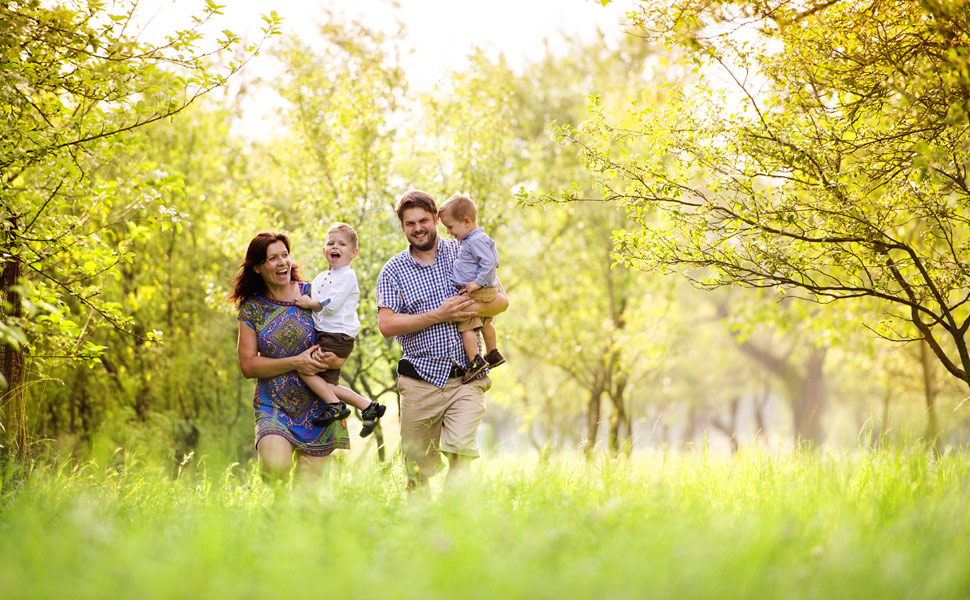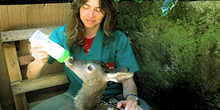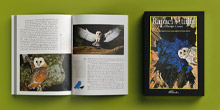Per migliaia di anni l’uomo ha vissuto a stretto contatto con la natura, adattando il proprio corpo e i propri sensi alle condizioni ambientali.
Negli ultimi 100 anni, però, nel mondo industrializzato l’uomo si è separato dalla natura, confinando il rapporto con essa a qualche sporadico contatto. Secondo molti ricercatori di ambiti diversi, questa “separazione” crea notevoli problemi di salute sia fisica che psicologica.
Se consideriamo, ad esempio, uno dei mali più diffusi in occidente, ossia lo stress, molte ricerche dimostrano che gli ambienti in cui trascorriamo il tempo possono aumentare o ridurre il nostro stress, il quale ovviamente influenza il nostro corpo. Quello che vediamo, ascoltiamo, tocchiamo in ogni momento cambia non soltanto il nostro umore, ma anche il nostro sistema nervoso, endocrino e immunitario. Ad esempio, lo stress causato da un ambiente non piacevole può farci sentire ansiosi e tristi. Questo si trasforma in un aumento della pressione sanguigna, della tensione muscolare e inficia il nostro sistema immunitario. Un ambiente piacevole ribalta questa situazione.
Qual è un ambiente ritenuto universalmente “piacevole”?
Indipendentemente dall’età o dalla cultura, gli esseri umani trovano piacevoli gli ambienti naturali. Nel libro “Healing Gardens” si cita uno studio in cui i ricercatori hanno scoperto che più dei due terzi delle persone sceglie un ambiente naturale per rifugiarsi quando si sente stressato o triste.
Ma la natura ci aiuta anche a convivere meglio con il dolore. Alcune ricerche in pazienti ricoverati dopo operazioni chirurgiche hanno dimostrato che la sola vista dalla finestra di un giardino permetteva ai pazienti di tollerare meglio il dolore post operatorio e di rimettersi prima di quelli che dalla propria finestra potevano vedere degli edifici.
 Un fatto fondamentale è che le attività in natura coinvolgono tutti i sensi, senza privilegiarne uno in particolare. Tatto, udito, gusto, olfatto e vista: tutti i sensi sono stimolati dalle attività in natura e questo permette anche a chi ha un deficit sensoriale di poter partecipare e trarne beneficio.
Un fatto fondamentale è che le attività in natura coinvolgono tutti i sensi, senza privilegiarne uno in particolare. Tatto, udito, gusto, olfatto e vista: tutti i sensi sono stimolati dalle attività in natura e questo permette anche a chi ha un deficit sensoriale di poter partecipare e trarne beneficio.
Inoltre, trascorrere del tempo in natura aumenta la nostra concentrazione. Molti studi su bambini con deficit dell’attenzione (ADHD) dimostrano che se posti in un ambiente naturale aumentano notevolmente la loro soglia di attenzione rispetto ad un ambiente chiuso (Taylor, A., Kuo, F. (2008). Children with attention deficits concentrate better after walk in the park. Journal of Attention Disorders; 12 (5), 402-09).
Ma la natura ha un effetto positive anche sulle relazioni sociali: una ricerca dell’American Institutes for Research del 2005 ha dimostrato che gli studenti che partecipano ad attività in natura imparano a comunicare in maniera più efficace con i loro pari.
Bibliografia:
References Berman, M. G., Jonides, J., & Kaplan, S. (2008). The cognitive benefits of interacting with nature. Psychological Science, 19(12), 1207-1212.
Bowler, D. E., Buyung-Ali, L. M., Knight, T. M., & Pullin, A. S. (2010). A systematic review of evidence for the added benefits to health of exposure to natural environments. BMC Public Health, 10, 456.
Bringslimark, T., Patil, G., & Hartig, T. (2008). The Association Between Indoor Plants, Stress, Productivity And Sick Leave In Office Workers. Acta Horticulturae, 775, 117.
Cervinka, R., Röderer, K., & Hefler, E. (2012). Are nature lovers happy? On various indicators of well-being and connectedness with nature. Journal of Health Psychology, 17(3), 379-388.
Coley, R., Kuo, F. E., & Sullivan, W. C. (1997). Where does community grow? The social context created by nature in urban public housing. Environment and Behavior, 29(4), 468.
Devries, S. (2003). Natural environments -- healthy environments? An exploratory analysis of the relationship between greenspace and health. Environment and Planning, 35(10), 1717.
Diette, G. B., Lechtzin, N., Haponik, E., Devrotes, A., & Rubin, H. R. (2003). Distraction therapy with nature sights and sounds reduces pain during flexible bronchoscopy: A complementary approach to routine analgesia. Chest, 123(3), 941-948.
Dijkstra, K., Pieterse, M., & Pruyn, A. (2006). Physical environmental stimuli that turn healthcare facilities into healing environments through psychologically mediated effects: Systematic review. Journal of Advanced Nursing, 56(2), 166-181.
Hartig, T. (1991). Restorative effects of natural environment experiences. Environment and Behavior, 23, 3.
Hu, Z. (2008). Linking stroke mortality with air pollution, income, and greenness in northwest florida: An ecological geographical study. International Journal of Health Geographics, 7, 1.
Kim, T. (2010). Human brain activation in response to visual stimulation with rural and urban scenery pictures: A functional magnetic resonance imaging study Science of the Total Environment, 408(12), 2600.
Kuo, F. (2001). Aggression and violence in the inner city: Effects of environment via mental fatigue. Environment and Behavior, 33(4), 543.
Largo-Wight, E., Chen, W. W., Dodd, V., & Weiler, R. (2011). Healthy workplaces: The effects of nature contact at work on employee stress and health. Public Health Reports (Washington, D.C.: 1974), 126 Suppl 1, 124-130.
Lohr, V. (2007). Benefits of nature: What we are learning about why people respond to nature. J. Physiol Anthropol: 26(2), 83.
Marcus, C., & Barnes, M. (eds). (1999). Healing gardens ( Trans.). New York, NY: John Wiley and Sons.
Mind Organization. (2007). Ecotherapy: The green agenda for mental health. UK: Mind Publications.
Mitchell, R., & Popham, F. (2008). Effect of exposure to natural environment on health inequalities: An observational population study. Lancet, 372(9650), 1655-1660.
Morrison, C., & Gore, H. (2010). Relationship between excessive internet use and depression: A questionnaire-based study of 1,319 young people and adults. Psychopathology, 43(2), 121-126.
Park, S., & Mattson, R. (2009). Ornamental indoor plants in hospital rooms enhanced health outcomes of patients recovering from surgery. Journal of Alternative & Complementary Medicine, 15(9), 975-980.
Raudenbush, B, et al. (2001). Enhancing athletic performance through the administration of peppermint odor. J Sport Exerc Psychol; 23:156–60.
Stamatakis, E. (2011). Screen-based entertainment time, all-cause mortality, and cardiovascular events: Population-based study with ongoing mortality and hospital events follow-up. Journal of the American College of Cardiology, 57(3), 292-299.
Selub, E., Logan, A. (2012). Your brain on nature. Mississauga, Ontario: Wiley.
Shepley, M. Gerbi, R., Watson, A. Imgrund, S. Patient and staff environments: The impact of daylight and windows on ICU patients and staff. World Health Design. Accessed May 11, 2013 at http://www.worldhealthdesign.com/Patient-and-staff-environments.aspx
Taylor, A., Kuo, F. (2008). Children with attention deficits concentrate better after walk in the park. Journal of Attention Disorders; 12 (5), 402-09.
Ulrich, R. S. (1984). View through a window may influence recovery from surgery. Science, 224(4647), 420-421.
Ulrich, R. S., Simons, R. F., Losito, B. D., Fiorito, E., Miles, M. A., & Zelson, M. (1991). Stress recovery during exposure to natural and urban environments. Journal of Environmental Psychology, 11(3), 201-230.
Weinstein, N. (2009). Can nature make us more caring? Effects of immersion in nature on intrinsic aspirations and generosity. Personality and Social Psychology Bulletin, 35, 1315.




